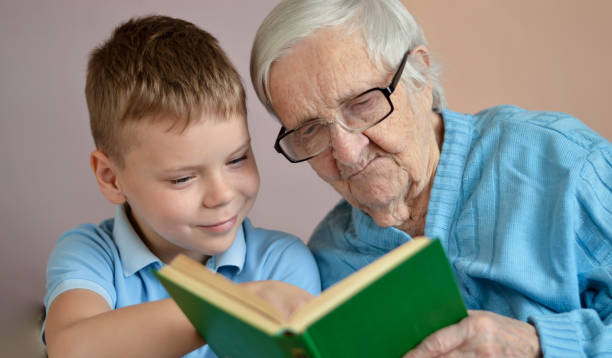Learning from Mistakes: A Theme in Grandpa’s Books

Storytelling has always played an essential role in how children learn and grow. From simple moral lessons to complex emotional truths, stories help children make sense of the world around them. Among the many themes that leave a lasting impression, learning from mistakes is one of the most valuable. In Grandpa’s books, this theme appears again and again, quietly guiding young readers toward accountability, empathy, and personal growth.
Grandpa’s stories often feature relatable characters who face everyday challenges. These characters may forget to share, tell a lie, or act out of impatience. Yet, what sets these tales apart is not the mistakes themselves but how the characters learn from them. Through gentle guidance, reflection, and honest consequences, Grandpa weaves a message that children can easily understand: it’s okay to make mistakes, as long as you learn and grow from them. That’s what makes titles like those found when you buy Grandpa’s Children’s Stories Book so powerful; they don’t shame children for failing; they show them how to try again with greater understanding.
In a world where perfection is often praised, these stories offer a refreshing take. They remind children that growth comes from trial and error. When young readers see beloved characters stumble and recover, they develop the resilience and emotional maturity needed to face their struggles.
Why Mistakes Matter in Children’s Learning
Children are naturally curious and eager to explore. With that curiosity comes the inevitability of error spilling juice, forgetting homework, or hurting someone’s feelings unintentionally. Mistakes are not signs of failure; they are essential stepping stones to growth. But how children respond to those mistakes is what shapes their character.
This is where storytelling becomes such an effective teaching tool. Unlike lectures or rules, stories allow children to witness consequences in a safe and non-threatening way. When they see a character face a similar mistake, they begin to understand their feelings and reactions. They may think, “I’ve done that too,” or “That’s how I felt.”
Grandpa’s books approach this process gently. There’s no harsh punishment or embarrassment, just thoughtful reflection. Children learn that making a mistake doesn’t make them bad; it simply means they have something new to learn. This lesson is especially effective when presented in stories where the consequences are realistic and the resolutions are warm and forgiving.
Moreover, stories allow children to explore the idea of cause and effect. They see that actions have consequences, but those consequences can be addressed with courage and kindness. This process builds both moral reasoning and emotional resilience skills that last a lifetime.
Memorable Mistake Moments in Grandpa’s Stories
Several stories in Grandpa’s collection highlight how children can grow through their missteps. One particularly moving tale features a young boy named Leo who, in his eagerness to win a game, cheats and hides an extra card. At first, no one notices, and Leo enjoys the victory. But later, his guilt grows. He avoids his friends and feels uneasy. When Grandpa finds him sitting alone, Leo admits what he did and fears everyone will be angry. Instead, Grandpa guides him to apologize and make it right. His friends are disappointed but forgive him, and Leo never cheats again.
Another standout story follows a young girl named Mira who forgets to feed her pet bird. Distracted by play, she assumes it’s fine until the bird becomes ill. Filled with guilt, she cares for it around the clock, learning to be more responsible. Grandpa uses this story to show how small oversights can have big consequences, but also how love and commitment can make a difference.
In yet another tale, two siblings argue over who broke a vase. Neither wants to admit it, and they begin blaming each other. Only when they come together and admit they were both at fault does the tension dissolve. This story highlights not just honesty, but shared responsibility.
These stories are powerful because they are real. They mirror the kinds of experiences children face daily, small mistakes that feel huge in the moment. Yet, Grandpa’s storytelling always points the way forward: honesty, reflection, and growth.
How Children Internalize These Lessons
When children read about characters who make mistakes and learn from them, something remarkable happens: they begin to apply those lessons in their own lives. Storytelling helps them process experiences they might not yet have the language to describe. It bridges the gap between emotion and action.
For example, a child who reads about Leo cheating may hesitate before doing the same. Or a child who forgets a responsibility may remember Mira and act more mindfully. These connections don’t happen through instruction one; they happen through emotional resonance. Children need to hear the story to remember the lesson.
Additionally, Grandpa’s stories are often read repeatedly, which reinforces their messages. Repetition not only improves memory but also helps children see deeper meanings as they grow older. A story that once made them laugh may later make them think. These evolving interpretations deepen the impact of the lesson and shape a child’s sense of right and wrong.
Another important aspect is that these stories build self-compassion. Children learn that it’s okay to admit when they’ve done something wrong. The goal isn’t perfection, it’s progress. And in a world where kids often feel pressure to be the best, that lesson is both timely and essential.
Using Grandpa’s Books to Encourage Reflection
Grandpa’s books are not just for passive reading; they are tools for conversation. After reading a story, parents and grandparents can gently guide children to reflect on what happened. Questions like, “What would you have done?” or “Have you ever felt that way?” create space for open discussion.
This kind of dialogue helps children connect the story to their own lives. It also strengthens family bonds, as children feel safe discussing mistakes without fear of judgment. When a trusted adult shares their learning moments, like forgetting something important or making an unkind choice, it further normalizes the idea that mistakes are part of life.
Another effective approach is encouraging children to retell the story in their own words or even change the ending. This creative exercise not only enhances comprehension but also gives them a sense of agency. They begin to see themselves as capable of making better choices and achieving better outcomes.
Reading Grandpa’s stories before bedtime can also create a comforting routine. Children go to sleep not only entertained, but also emotionally reassured. They understand that tomorrow is a new chance to do better to try again.
Conclusion
In every thoughtful pause, every lesson quietly embedded in a story, Grandpa’s books teach one of life’s most important truths: we grow through our mistakes. These stories offer more than entertainment; they provide a safe space for children to explore, stumble, and rise again with understanding.
By reading and reflecting on these stories, children learn to face their challenges with courage and honesty. They realize that failure isn’t the end, but rather a step toward wisdom. Whether through forgotten responsibilities, poor decisions, or hurtful words, each mistake becomes a doorway to learning.
When families buy Grandpa’s books, they’re not just getting charming tales; they’re investing in emotional and moral development. These timeless stories will be read again and again, always with the same result: children who grow into thoughtful, kind, and resilient human beings.




